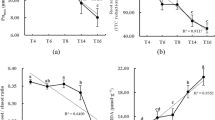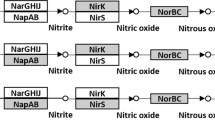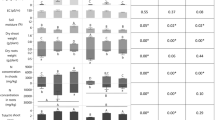Abstract
THE origin of ethylene in the soil atmosphere is of interest because the concentrations at which it sometimes occurs can restrict plant growth by inhibiting root extension in cereals1 and root nodulation in legumes2; it has also been suggested that it aids plants by inhibiting pathogenic fungi3. Our earlier observations showed that ethylene could be produced by a soil fungus, Mucor hiemalis, and two soil yeasts, which have now been identified as Candida vartiovaarai and Trichosporon cutaneum, when glucose and methionine were available to them4. Subsequent investigations in pure culture and in soil have attempted to elucidate mechanisms by which these organisms could synthesise the gas5–7. Other investigators3,8 have proposed that anaerobic spore-forming bacteria rather than fungi are largely responsible for ethylene formation in soil as: (1) heat does not prevent the formation of the gas in soil, (2) anaerobiosis favours its formation and (3) the gas is fungi-static. Further experiments have therefore been undertaken in an attempt to assess if these latter observations cast doubt on our conclusions; the results are reported here.
This is a preview of subscription content, access via your institution
Access options
Subscribe to this journal
Receive 51 print issues and online access
$199.00 per year
only $3.90 per issue
Buy this article
- Purchase on Springer Link
- Instant access to full article PDF
Prices may be subject to local taxes which are calculated during checkout
Similar content being viewed by others
References
Smith, K. A., and Russell, R. S., Nature, 222, 769–771 (1969).
Grobbelaar, N., Clarke, B., and Hough, M. C., Plant and Soil (special volume), 215–223 (1971).
Smith, A. M., Nature, 246, 311–313 (1973).
Lynch, J. M., Nature, 240, 45–46 (1972).
Lynch, J. M., and Harper, S. H. T., J. gen. Microbiol., 80, 187–195 (1974).
Lynch, J. M., J. gen. Microbiol., 83, 407–411 (1974).
Lynch, J. M., and Harper, S. H. T., J. gen. Microbiol., 85, 91–96 (1974).
Smith, A. M., and Cook, R. J., Nature, 252, 703–705 (1974).
Rovira, A. D., and Vendrell, M., Soil Biol. Biochem., 4, 63–69 (1972).
Smith, K. A., and Restall, S. W. F., J. Soil Sci., 22, 430–443 (1971).
Abeles, F. B., Craker, L. E., Forrence, L. E., and Leather, G. R., Science, 173, 914–916 (1971).
Lockhart, C. L., Can. J. Pl. Sci., 50, 347–349 (1970).
Lockhart, C. L., Forsyth, F. R., and Eaves, C. A., Can. J. Pl. Sci., 48, 557–559 (1969).
Hislop, E. C., Hoad, G. V., and Archer, S. A., in Fungal Pathogenicity and the Plant's Response (edit. by Byrde, R. J. W., and Cutting, C. V.), 87–117 (Academic, London, 1973).
Freebairn, H. T., and Buddenhagen, I. W., Nature, 202, 313–314 (1964).
Bird, C. W., and Lynch, J. M., Chem. Soc. Rev., 3, 309–328 (1974).
Author information
Authors and Affiliations
Rights and permissions
About this article
Cite this article
LYNCH, J. Ethylene in soil. Nature 256, 576–577 (1975). https://doi.org/10.1038/256576a0
Received:
Accepted:
Issue Date:
DOI: https://doi.org/10.1038/256576a0
This article is cited by
-
Spotting ethylene in forest soils—What influences the occurrence of the phytohormone?
Biology and Fertility of Soils (2023)
-
Effect of antibiotics on ethylene production by soil micro-organisms
Plant and Soil (1983)
-
Effects of ethrel on the formation and responses to VA mycorrhiza in Medicago and Triticum
Plant and Soil (1981)
Comments
By submitting a comment you agree to abide by our Terms and Community Guidelines. If you find something abusive or that does not comply with our terms or guidelines please flag it as inappropriate.



